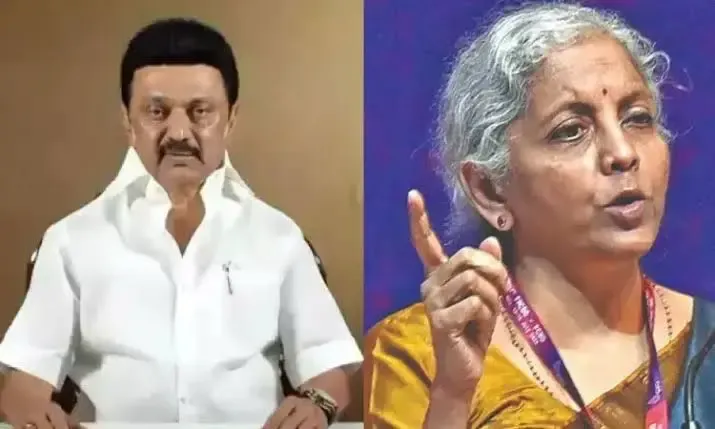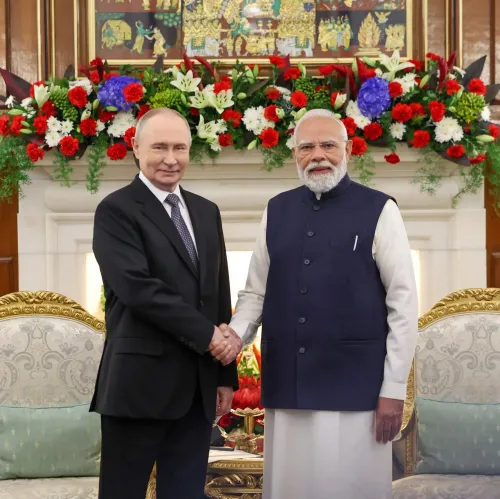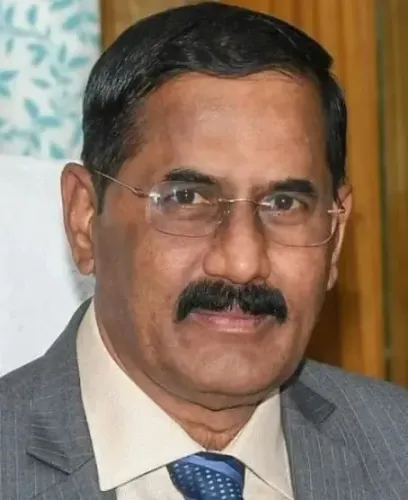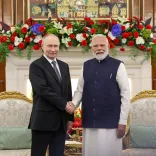Tamil Nadu Government's Removal of Rupee Symbol from Budget Logo Raises Concerns on National Unity: FM Sitharaman

Synopsis
Key Takeaways
- CM M.K. Stalin removed the rupee symbol from the Budget logo.
- Union FM Nirmala Sitharaman criticized the decision.
- The move is seen as undermining national unity.
- Critics call it a display of regional chauvinism.
- The symbol was designed by a Tamil youth, D. Udaya Kumar.
Chennai, March 13 (NationPress) The choice made by Tamil Nadu Chief Minister M.K. Stalin to eliminate the rupee symbol (₹) from the emblem of the state’s 2025-26 Budget, which is set to be unveiled in the Assembly on Friday, has ignited significant backlash.
Among the critics is Union Finance Minister Nirmala Sitharaman, who has publicly denounced this decision.
In a statement on the social media platform X, she admonished the DMK government for what she termed “a wholly unnecessary instance of linguistic and regional favoritism.”
Sitharaman emphasized that this decision showcases a troubling mentality that jeopardizes India’s unity.
She challenged the DMK's stance against the rupee symbol, reminding them that it was officially adopted in 2010 under the Congress-led UPA administration, during which the DMK was part of the ruling coalition at the national level.
“This is more than just symbolism; it represents a dangerous mindset that diminishes Indian unity and encourages separatist tendencies under the guise of regional pride. It is a completely unnecessary example of linguistic and regional bias,” she stated.
Furthermore, she urged elected officials to remember their constitutional obligation to safeguard the nation’s sovereignty and integrity, noting that omitting a national symbol from state Budget documents goes against that responsibility.
Union Minister Sitharaman also pointed out the irony in this decision, highlighting that the rupee symbol was designed by D. Udaya Kumar, the son of former DMK MLA N. Dharmalingam.
“By removing it now, the DMK is not only rejecting a national symbol but also completely ignoring the creative achievement of a Tamil individual,” she remarked.
BJP IT Cell Chief Amit Malviya also voiced his disapproval of the move, asserting that Udaya Kumar, who crafted the symbol in the Devanagari script, is indeed the son of a former DMK MLA.
“Chief Minister Stalin is disrespecting Tamilians by eliminating the Indian rupee (₹) sign from the Tamil Nadu Budget 2025-26 document,” he expressed on X.
Meanwhile, AIADMK General Secretary and Leader of the Opposition Edappadi K. Palaniswami also criticized the DMK government’s action, characterizing it as a publicity stunt aimed at shifting focus from administrative shortcomings.
In a post on social media, he accused Chief Minister Stalin of pursuing “hollow advertisement campaigns” that fail to address the genuine needs of the populace.
He further condemned CM Stalin for delivering “scripted lines crafted by others,” dismissing the action as a political maneuver.
Tamil Nadu BJP President K. Annamalai joined the wave of criticism, questioning Stalin's choice to substitute the rupee symbol with the Tamil letter “Ru” from “Rubaai,” the Tamil term for rupee.
“The DMK government’s state Budget for 2025-26 replaces the rupee symbol, which was designed by a Tamilian and accepted by the entire nation. How misguided can you be, Thiru @mkstalin?” he wrote.
This controversy arises amid an ongoing conflict between the Tamil Nadu government and the Centre regarding language policies, with the DMK-led administration frequently accusing the Union government of enforcing Hindi.
The exclusion of the rupee symbol is perceived as part of this broader opposition, escalating Tamil Nadu's resistance to the National Education Policy.
The Tamil Nadu government defended its choice, stating that the Budget logo, released on Thursday, now features the Tamil letter “Ru” from “Rubaai” to honor the state's linguistic heritage.
The logo also bears the caption “Everything for All,” which the DMK asserts embodies its inclusive governance model.
This incident marks the first instance of a state rejecting the national currency symbol, intensifying discussions about regional identity versus national unity.










